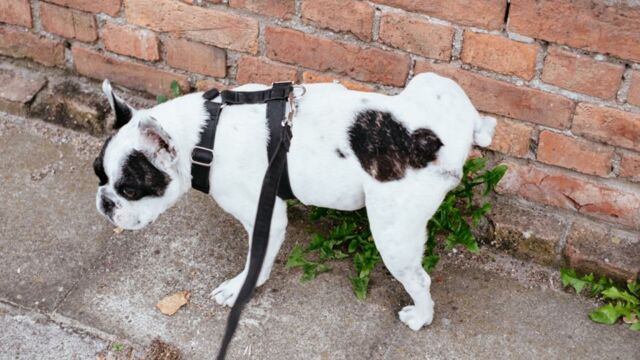When your dog needs to pee, they use their body language and send signs, although these signs can mean other things too. Understanding the potty time frequency depending on your dog's individual circumstances can help you find the answers and potentially make your pet’s life more comfortable (and avoid a mess at home, of course).
Discover our latest podcast
Every dog is different

On average, dogs need to go outside at least 3 to 5 times per day to have the opportunity to relieve themselves. Vets recommend that adult dogs go no more than 6-8 hours between trips outdoors.
But just like every human, every pet is different. Several factors can increase or decrease the amount of time your dog has between trips to the bathroom. They include the age, breed, size, diet and liquid intake, and health situation.
Watch your dog’s habits carefully to understand its unique needs. If they become restless 3 hours after the latest number one session, it might be the right time for them to go again. This can be 6 hours too.
Making canines wait for too long or too frequently can lead to an increased risk of bladder, kidney, and urinary tract infections.
So how often do I take my dog out?
Brian Evans, DVM, medical director at Dutch, says that there are two most universal times to take your pet for a walk: first thing in the morning and again right before bed. From there, they need to go out one or two more times at a minimum, based on your schedule.
What about the puppies?

Puppies can't hold their urine until they're about 4 months old, Daily Paws writes. Taking them outside every one or two hours is the best way to prevent new wet spots in your house. When a fur-ball is about 2 months old, you might be able to safely expand to every two hours between the walks, depending on the animal.
Remember not to punish your puppy for toilet accidents as it might only make things worse.
Do older dogs need to pee more often?
While some senior pups maintain their ability to wait between the walks, others may develop incontinence as they reach the end of their life. Poor nerve function, bladder control, or conditions like arthritis can affect their ability to hold their urine.
It’s essential to speak to the vet and make a plan for how to support your ‘oldie’ in the best way. The solution can include arranging dog litter boxes, medications, or dog diapers.
What if my pet pees too much?

Consult a vet if your pooch’s potty behaviour pattern changes as it can indicate some underlying health conditions.
An unusual odour of urine is often a sign of infection. Increased thirst and urination can be symptoms of diabetes. Blood in the urine of a male or spayed female dog suggests a problem with kidney stones, a urinary tract infection (UTI), or even a more serious medical issue, such as cancer.
Sources used:
- Daily Paws: ‘How Often Do Dogs Need to Pee? A Vet Explains’
- The Daily Wag: 'How Often Should Your Dog Go Out to Pee?'
Read more:
⋙ From lip-licking to tail-pointing-down: dog body language signs you shouldn’t ignore
⋙ Your dog cries each time it is reunited with you, but you might not see it
⋙ This heartbroken dog can’t bear to spend another Christmas in kennels and urgently needs a home















